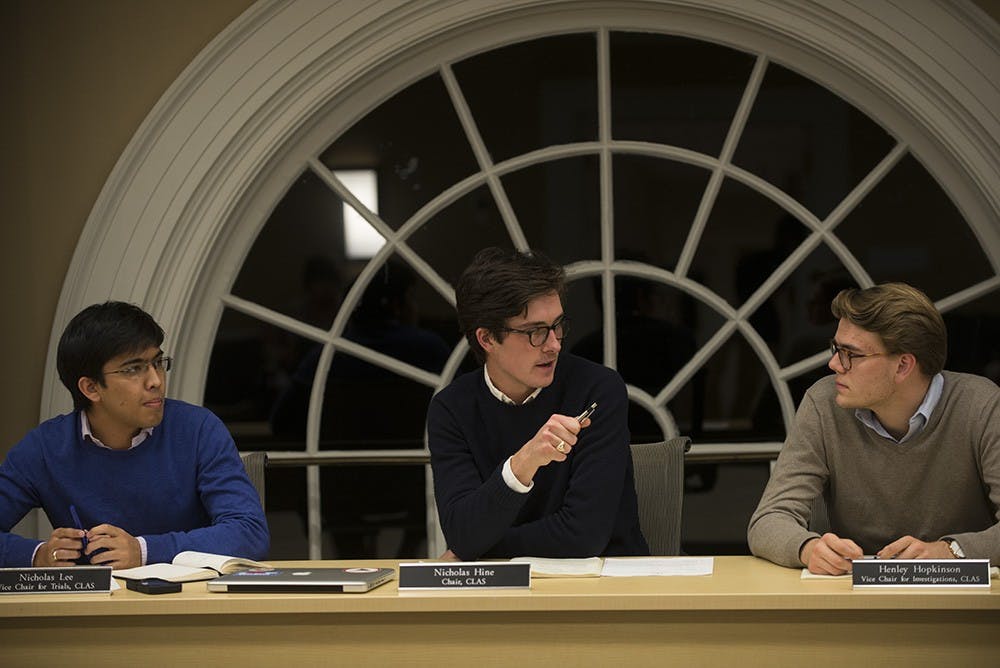University President Teresa Sullivan and the Honor Committee met Sunday to discuss the implications of the recent Rolling Stone article on the University’s system of student self-governance, and to address potential future attacks on such a system.
In the wake of a Rolling Stone article describing an alleged gang rape at a University fraternity and the school’s limited response, Sullivan said she had received numerous emails criticizing the honor system and calling for the elimination of the Honor Committee. She said student self-governance is unusually well-developed at the University, and as such, will be a critical issue in upcoming and ongoing examinations of University culture and policy.
“I think you do, as a group, uphold the highest values of the University,” Sullivan said to the Committee. “The fact that those values get violated doesn’t mean that they aren’t still values, doesn’t mean that we are hypocritical. People fall short of their ideals, but that’s not a reason for abandoning your ideals.”
Honor Committee Chair Nicholas Hine, a fourth-year College student, said the community’s shortcomings in executing these ideas make the Honor Committee all the more vital.
“We have these ideals, and people always fall short of them, and ... more than anything I think ... we need an Honor Committee,” he said. “We will never really get there, but that’s why we must always try. We are going to do our best to respond to this article in a way that we hope will show the value of having a student-run Honor Committee.”
With critics calling for the Committee’s dissolution, Sullivan said the occurrence of sexual misconduct in the community of trust will likely lead to a re-examination of the Honor Committee’s role in passing judgment on student behavior.
“There are really two schools of thought,” Sullivan said. “There’s the one that says we shouldn’t have students make these decisions at all so we should abolish the Honor Committee, and then there’s the other one which says the Honor Committee is great except it doesn’t hear about sexual assault. You’ve got to navigate, somehow, a way in between.”
Sullivan said she did not have a particular plan to help the Honor Committee address future scrutiny — even hostility — but that she wanted to give the group a warning of what might come.
“I’m happy to support you in any way I can,” Sullivan said.
The only way for the Honor Committee or the honor system to be directly, procedurally impacted is by action on the part of the Board of Visitors, which has received appeals to make such changes. However, Sullivan said the Board would not consider any such amendments at its meeting this Tuesday.
“Right now, the delegation of authority to change honor comes from the Board of Visitors manual, and they can amend the manual,” Sullivan said. “Before they change their manual, they need to have a meeting of the executive committee and the executive committee is not scheduled to meet — that bars them doing anything to the manual on Tuesday.”
Sullivan said for this reason, and because of support from alumni, she felt it was unlikely changes to the honor system would happen in the near future. In the long run, however, she said she is less certain.
“I haven’t heard any kind of ground swell in doing that among Board members,” Sullivan said. “Could the pressure build up on them? Yeah. But I think there will also be a counterweighting pressure on the part of alumni who think the honor system is great, so I’m not necessarily worried about it in the short run. It could be an issue in the longer term.”
Sullivan and the Committee also addressed the issue of single sanction as applicable to sexual violence, with some Committee members saying they had heard wide student support for the idea.
Fourth-year Architecture representative Tyler Pitt said he felt many students think sexual violence should fall under what the community has established as intolerable behaviors.
“I think one thing we need to think about going forward is whether we’d like to take a stand in terms of whether or not we should recommend that sexual assault fall under a single sanction, though obviously not adjudicated by us,” Pitt said. “In terms of an ideal, if you’re thinking this is a community that does not allow these actions, I think most people would agree that rape and sexual assault would fall under these things that we find intolerable.”
Sullivan said one of the obstacles to a single sanction is the potential wide variety of sexual assaults which could occur.
“Sexual misconduct is a whole range of behaviors, all the way from verbal harassment to rape,” Sullivan said. “If you have a student who, [let’s] say, is cyber stalking and doesn’t realize that that’s offensive and shouldn’t be done — do you want to expel that student for that, or would a lesser sanction make sense?”
Sullivan said there are a number of circumstances where there is an opportunity to educate students and intervene to prevent future sexual assaults — a possibility which could be lost if the single sanction policy were applied to all acts of sexual misconduct.
For this reason and others, Pat Lampkin, vice president and chief student affairs officer, said the University administration is extending the commenting period for the newly proposed policy changes to the University’s sexual misconduct policy.
“Tomorrow, we’ll extend the comment period through the 12th, because we’re getting so much energy about it, which is great,” Lampkin said. “The dominant theme right now [among comments] is to have expulsion be the mandatory sanction. So we will really consider that. We’re really looking at all of these.”
Committee members said many students felt the responses to sexual violence and responses to issues of lying, stealing and cheating are incompatible, and action should be taken to resolve these alleged disparities.
However, Vice Chair for Investigations Henley Hopkinson, a fourth-year College student, said the student body's desires may not always align with the desires of survivors.
“I share your enthusiasm, and I think what we definitely need to keep in mind is that the will of the student body is very important,” Hopkinson said. “But the most important issue is the will of the survivor, and the will of the survivor may not always be for there to be a single sanction.”
To help increase involvement in sexual assault prevention and to sort through potential uncertainties like this, the Honor Committee unanimously voted Sunday to create a yet-unnamed sexual assault subcommittee. The subcommittee will help the larger group contribute to the movement against sexual violence at the University.
The Honor Committee is prohibited by federal law from overseeing cases of sexual assault, but Committee members said the body can still contribute to the fight against violence. As stated in a Committee letter responding to recent allegations, the group will “strive to support student advocacy across Grounds and further promote discussion about the ideal of honor as it relates to sexual assault.”
As part of this effort, Committee members and support officers will be trained in violence prevention strategies through Green Dot, a new program seeking to reduce sexual misconduct.
“We acknowledge that the Honor Committee cannot directly adjudicate the cases at hand, but we will — and must — continue to work with the community towards a safer University,” the letter read. “No matter the constraints of federal legislation or personal feelings about Honor Committee policies, we must remain united in our pursuit of the highest standards of trust, integrity and accountability in our University.”
Though the Committee cannot be directly involved with adjudicating sexual assault cases and consequently, cannot be involved in the decision of implementing a single sanction system in response to sexual misconduct, Hine said the Committee would be happy to help the University administration in discussion.
“Given that Honor has a lot of experience with the single sanction system, we may be in a position to provide some level of guidance in that aspect,” Hine said. “If we are asked to assist, then we will definitely answer that call.”
Correction: A previous version said Pres. Sullivan met with the "Executive Board" of the Honor Committee. She met with the full 27-person Honor Committee.





